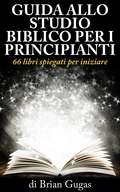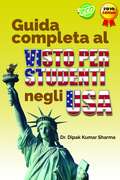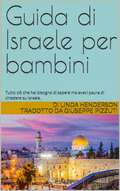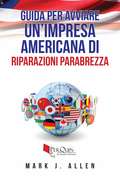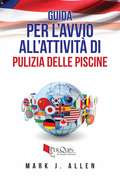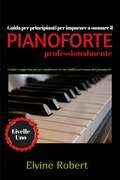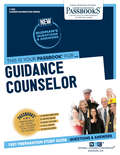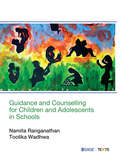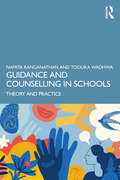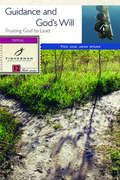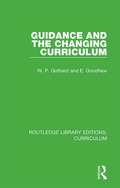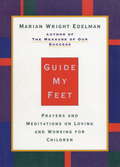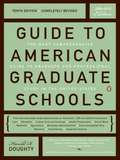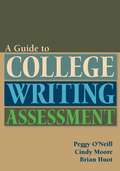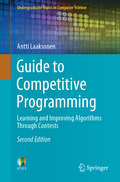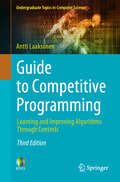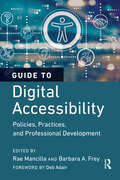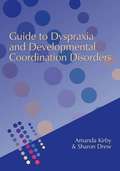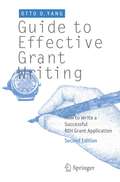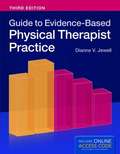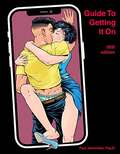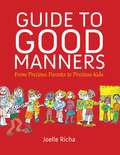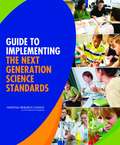- Table View
- List View
Guida allo Studio Biblico per i Principianti
by David Abraham Brian GugasDurante i tempi, gli uomini si sono rivolti alla Bibbia alla ricerca di indicazioni e di speranza. Questo studio Biblico serve come mappa per principianti, per aiutarli a sviluppare un'apprezzamento della Bibbia e a fare che essa diventi parte della loro vita giornaliera. Sono descritti tutti i 66 libri della Bibbia, includendo: * L'autore di ogni libro, e il periodo di tempo nel quale questo fu scritto * I temi chiave per ogni libro * Il sommario del messaggio trasmesso da ogni libro * Un citato per contemplazione e spiegazioni piu precise Immergetevi nelle storie, nelle profezie e nei messaggi della Bibbia, e scoprite di nuovo la forza, la pieta e il potere di guarire di Dio e di Gesu Cristo. Piena di grazia e di ispirazione, La Guida allo Studio Biblico per Principianti riporta il lettore ai fondamenti e apre la via per un rapporto diretto con la Parola Vivente del Signore.
Guida completa al VISTO PER STUDENTI negli USA
by Dr Dipak Kumar SharmaQuesto è "il libro di tutti i libri" per quanto riguarda il visto americano. Contiene tutte le informazioni necessarie dalla raccolta dei documenti per richiedere il visto all'ottenimento della cittadinanza. È utile sia a chi sta pensando di studiare negli USA sia a chi si trova già lì e ha bisogno di chiarimenti su alcuni punti. La sua stesura sotto forma di domande e risposte fa luce su qualsiasi passo della procedura di domanda, il viaggio, l'università, la vita, il lavoro, l'uscita e la cittadinanza. Il libro è disponibile anche in inglese, spagnolo, portoghese e cinese.
Guida di Israele per bambini: Tutto ciò che hai bisogno di sapere ma avevi paura di chiedere su Israele.
by Linda HendersonIsraele è un posto bellissimo. Ogni bambino, giovane e adulto deve sapere perché il Medio Oriente è così importante. Conoscere Israele e i suoi vicini vi aiuterà a vedere che c'è molto oltre la guerra e i conflitti nel Medio Oriente. Questo libro potrebbe cambiare le vostre vite. Volete imbarcarvi in questa avventura verso la Terra Sacra?
Guida per avviare un'impresa americana di riparazioni parabrezza
by Mark J. AllenIl libro rappresenta una guida per aiutare coloro che si accingono ad avviare un'impresa, piu' nello specifico nel settore delle riparazioni di parabrezza. L'autore spiega in maniera semplice e comprensibile a tutti, quali passi seguire per aprire una start-up, dalla scelta del nome all'identificazione di un mercato in cui sviluppare la propria attivita'. Deprivato di tecnicismi e gergo del mestiere, il testo si adatta bene a chiunque si stia affacciando al mondo del business, o sia semplicemente curioso di conoscerne le dinamiche interne, senza tuttavia doversi imbarcare in una lettura farraginosa e puramente teorica. Del resto non vi e' miglior insegnante dell'esperienza stessa per imparare un mestiere - tanto vale iniziare subito con una buona lettura che motivi e accresca l'entusiasmo per la vostra futura attivita'.
Guida per l'avvio all'attività di pulizia delle piscine
by Mark J. AllenQuesta guida vi mostrerà tecniche efficaci per creare un business proficuo nella pulizia delle piscine anche durante questi periodi economici incerti. Al termine della lettura di questa guida, imparerai suggerimenti e trucchi per iniziare la tua attività con un investimento minimo. Imparerai a scegliere correttamente la struttura legale della tua azienda. Inoltre, imparerai quali errori creeranno nuovi imprenditori e come evitarli! Se sei interessato nel guadagnare più soldi in fretta, questa è la guida per te. Oltre a suggerimenti per risparmiare ed ottimizzare il tempo, troverai idee di marketing estremamente efficaci e segreti aziendali. Comincia oggi il tuo cammino verso l'essere il capo di te stesso.
Guida per principianti per imparare a suonare il pianoforte professionalmente: Guida e suggerimenti per migliorare le tue abilità nel suono del pianoforte (Livelle Uno #1)
by Elvine RobertImpara a suonare il pianoforte, non per rimanere un mediocre, ma per diventare un professionista. Cliccando e leggendo di più, scopriresti che ciò che stavi cercando, lo hai sempre avuto davanti! Quando leggerai il primo libro di questa serie di libri guida per l'apprendimento professionale del pianoforte, rivolta ai principianti, imparerai come dare inizio all'utlizzo del tuo strumento preferito: •in che modo i 12 tasti si relazionano tra di essi; •i differenti modi di una scala e come suonare le scale maggiori e minori; •le tecniche di diteggiatura; •tecniche semplici e progressioni degli accordi; •le alterazioni degli accordi; •e molto altro! Con questo libro, potrai iniziare a suonare il pianoforte senza leggere gli spartiti. Questa serie darebbe inizio ad un grande viaggio verso l'apprendimento del pianoforte! NON PERDERE QUESTA GRANDE OCCASIONE, OTTIENI ADESSO LA TUA COPIA! Per ottenere la tua copia, scorri verso l'alto e clicca sul pulsante ACQUISTA o AGGIUNGI AL CARRELLO. Fa anche attenzione al LIVELLO DUE di questa serie di libri.!
Guidance Counselor: Passbooks Study Guide (Career Examination Series #C-305)
by National Learning CorporationThe Guidance Counselor Passbook® prepares you for your test by allowing you to take practice exams in the subjects you need to study. It provides hundreds of questions and answers in the areas that will likely be covered on your upcoming exam.
Guidance and Counselling for Children and Adolescents in Schools
by Namita Ranganathan Toolika WadhwaThis book effectively presents an insightful blend of theoretical ideas, practical realities and ways of engaging with children and adolescents. Guidance and Counselling for Children and Adolescents in Schools provides a rich understanding of the challenges, problems and difficulties that children and adolescents face in adjusting to the contexts in which they live, grow and study. All teacher-education programmes expansively define the role of teachers and their responsibility towards guiding and counselling students. This book serves to help student-teachers and in-service teachers to understand their role as counsellors and build perspectives about the mental health concerns of students. Rendering ground realities within theoretical approaches to psychotherapy and mental health, it serves as a useful resource for practitioners and researchers in education. The book is based on more than three decades of experience of the authors in the fields of education and psychology and experiential understanding of contemporary times. Key Features: • Unique approach in correlating real-life situations and experiences to the explanation of theories •Builds understanding about guidance, counselling and mental health issues through a theory - practice interface •Provides anecdotes, case vignettes and narratives to aid self-directed learning of counselling skills •Couched in the contemporary Indian socio-cultural setting
Guidance and Counselling in Schools: Theory and Practice
by Namita Ranganathan Toolika WadhwaThis book addresses guidance and counselling needs of children and adolescents in school settings. Acknowledging that most issues which children and adolescents face do not reach clinical settings and are often addressed by primary caregivers, the book focuses on specific strategies that primary caregivers can use. With an overview of mental health concerns that arise during these developmental stages, the book focuses specifically on the roles that parents and teachers can play. Home and school together play vital roles in the lives of children and adolescents. The book thus recognises the need for them to work together and uses examples from the field to build contexts in which school children and adolescents grow. This is attempted in the backdrop of theories of psychology and mental health therapies. The volume tries to bridge the gap between theory and practical applications of mental health in everyday life. This book would be useful to the students, researchers, and teachers working in the fields of education, psychology, development studies, social work, and sociology. It would also be an invaluable companion to policy-makers, professionals from government and non-government organisations working around education and social development.
Guidance and God's Will
by Tom Stark Joan StarkDecisions, DecisionsDoes God really guide his children? How do people discover his will for them? How should you balance biblical principles of divine guidance with daily circumstances, personal inclinations, and the advice of friends? As you use this study guide, you will find yourself searching out Scripture, discovering principles from the life of the apostle Paul, and applying them to your daily life.
Guidance and the Changing Curriculum (Routledge Library Editions: Curriculum #12)
by W. P. Gothard E. GoodhewOriginally published in 1987. This book examines the growth of pastoral care and the pastoral curriculum, and innovations in vocational education in schools. These two major developments are considered in relation to the guidance and counselling movement whose impact on education over the preceding twenty-five years was considerable. The concept of person-centred learning grew out of this movement and with it many of the liberalising changes in education. This is a fascinating look at this area from a time when the whole nature and direction of schooling in the UK was about to change.
Guide My Feet
by Marian Wright EdelmanThe founder of the Children's Defense Fund and author of The Measure of Our Success presents prayers and meditations to inspire all those, such as parents, teachers, and ministers, who work on the behalf of children.Marian Wright Edelman, founder and president of the Children's Defense Fund, is one of the most important moral leaders in America. Her first book, The Measure of Our Success was a #1 New York Times bestseller--spending 16 weeks on the list, selling more than 450,000 copies and garnering spectacular praise from Hillary Clinton, Maya Angelou, and Oprah Winfrey. Guide My Feet continues her crusade for the well-being of America's children by providing a counterweight to the lesson society is teaching this generation of children--to be soulless takers instead of empowered givers.Guide My Feet is a collection of prayers and meditations gathered from Edelman's own holiday rituals and experiences and the writings of such inspiring leaders as Dr. Martin Luther King Jr., Gandhi, and Frederick Douglass. It urges readers to commit to and pray for strength and patience, and offers solace and direction for parents troubled by the commercialism and violence running rampant in today's society. Filled with wisdom, compassion and understanding, it provides an important spiritual and moral resource all caregivers can turn to as they strive to instill values, integrity, self-discipline and faith in children.
Guide pour les Femmes: En Moins de 4 Semaines
by Sarah JamesGuide pour les femmes : Comment récupérer votre ex pour de bon par Sarah James En moins de 4 semaines ! Un guide pour les femmes qui veulent retrouver leur ex pour de bon : en moins de 4 semaines ! Est-ce que vous avez des remords ou des regrets d'avoir rompu avec votre EX ? Vous voulez donner une seconde chance à votre relation ou à votre mariage précédent ? Si vous voulez avoir les meilleures chances pour retrouver votre EX, ce guide est fait pour vous. Nous utilisons les stratégies les plus éprouvées, ainsi qu'un processus que vous pouvez suivre, pas à pas, pour vous remettre, de façon efficace, avec votre ex. Notre guide couvre les points suivants : - Une procédure étape par étape sur la façon de se remettre ensemble. - Conseils et stratégies. - Une psychologie pour augmenter vos chances de réussite. - Comment s'y prendre et quel processus utiliser pour reprendre contact avec votre ex. - ET BIEN PLUS ENCORE ! Si vous souhaitez améliorer votre relation avec votre ex pour finalement vous remettre avec lui, ce guide est fait pour vous.
Guide to American Graduate Schools: Tenth Edition, Completely Revised
by Harold R. DoughtyNewly revised and updated-the most comprehensive and up-to-date graduate school manual available In this, the industry standard for graduate school guides for more than thirty years, Harold R. Doughty draws on his insider's knowledge to present this impeccably organized and streamlined resource essential to selecting the right graduate or professional school. It includes: * profiles of more than 1,250 accredited institutions, including enrollment, locations, libraries and other facilities, and housing situations * admissions standards and requirements * tuition costs and opportunities for financial aid and grants * details on scholarships, fellowships, assistantships, and Internships * helpful indexes for quick and easy references and comparisons The Guide to American Graduate Schools is an indispensable and user-friendly tool for any student hoping to continue their graduate or professional education.
Guide to Analysis of Language Transcripts
by Kristine S. RetherfordGuide to Analysis of Language Transcripts is now in its third edition This updated text is more reader-friendly and includes analysis practice on CD-ROM, too. Through the use of this comprehensive text readers learn classic semantic, syntactic, and pragmatic analysis. The opening chapter thoroughly explains the collection and transcription of conversation speech samples. The GALT presents hundreds of helpful example utterances (with full explanations) plus four transcriptions for analysis.
Guide to College Writing Assessment
by Peggy O'Neill Cindy Moore Brian HuotWhile most English professionals feel comfortable with language and literacy theories, assessment theories seem more alien. English professionals often don’t have a clear understanding of the key concepts in educational measurement, such as validity and reliability, nor do they understand the statistical formulas associated with psychometrics. But understanding assessment theory—and applying it—by those who are not psychometricians is critical in developing useful, ethical assessments in college writing programs, and in interpreting and using assessment results. A Guide to College Writing Assessment is designed as an introduction and source book for WPAs, department chairs, teachers, and administrators. Always cognizant of the critical components of particular teaching contexts, O’Neill, Moore, and Huot have written sophisticated but accessible chapters on the history, theory, application and background of writing assessment, and they offer a dozen appendices of practical samples and models for a range of common assessment needs. Because there are numerous resources available to assist faculty in assessing the writing of individual students in particular classrooms, A Guide to College Writing Assessment focuses on approaches to the kinds of assessment that typically happen outside of individual classrooms: placement evaluation, exit examination, programmatic assessment, and faculty evaluation. Most of all, the argument of this book is that creating the conditions for meaningful college writing assessment hinges not only on understanding the history and theories informing assessment practice, but also on composition programs availing themselves of the full range of available assessment practices.
Guide to Competitive Programming: Learning and Improving Algorithms Through Contests (Undergraduate Topics in Computer Science)
by Antti LaaksonenBuilding on what already is the most comprehensive introduction to competitive programming, this enhanced new textbook features new material on advanced topics, such as calculating Fourier transforms, finding minimum cost flows in graphs, and using automata in string problems. Critically, the text accessibly describes and shows how competitive programming is a proven method of implementing and testing algorithms, as well as developing computational thinking and improving both programming and debugging skills.Topics and features: introduces dynamic programming and other fundamental algorithm design techniques, and investigates a wide selection of graph algorithms; compatible with the IOI Syllabus, yet also covering more advanced topics, such as maximum flows, Nim theory, and suffix structures; surveys specialized algorithms for trees, and discusses the mathematical topics that are relevant in competitive programming; reviews the features of the C++ programming language, and describes how to create efficient algorithms that can quickly process large data sets; discusses sorting algorithms and binary search, and examines a selection of data structures of the C++ standard library; covers such advanced algorithm design topics as bit-parallelism and amortized analysis, and presents a focus on efficiently processing array range queries; describes a selection of more advanced topics, including square-root algorithms and dynamic programming optimization.Fully updated, expanded and easy to follow, this core textbook/guide is an ideal reference for all students needing to learn algorithms and to practice for programming contests. Knowledge of programming basics is assumed, but previous background in algorithm design or programming contests is not necessary. With its breadth of topics, examples and references, the book is eminently suitable for both beginners and more experienced readers alike.
Guide to Competitive Programming: Learning and Improving Algorithms Through Contests (Undergraduate Topics in Computer Science)
by Antti LaaksonenThis textbook features new material on advanced topics, such as calculating Fourier transforms, finding minimum cost flows in graphs, and using automata in string problems. Critically, the text accessibly describes and shows how competitive programming is a proven method of implementing and testing algorithms, as well as developing computational thinking and improving both programming and debugging skills. Topics and features: Introduces dynamic programming and other fundamental algorithm design techniques, and investigates a wide selection of graph algorithms Compatible with the IOI Syllabus, yet also covering more advanced topics, such as maximum flows, Nim theory, and suffix structures Provides advice for students aiming for the IOI contest Surveys specialized algorithms for trees, and discusses the mathematical topics that are relevant in competitive programming Examines the use of the Python language in competitive programming Discusses sorting algorithms and binary search, and examines a selection of data structures of the C++ standard library Explores how GenAI will impact on the future of the field Covers such advanced algorithm design topics as bit-parallelism and amortized analysis, and presents a focus on efficiently processing array range queries Describes a selection of more advanced topics, including square-root algorithms and dynamic programming optimization Fully updated, expanded and easy to follow, this core textbook/guide is an ideal reference for all students needing to learn algorithms and to practice for programming contests. Knowledge of programming basics is assumed, but previous background in algorithm design or programming contests is not necessary. With its breadth of topics, examples and references, the book is eminently suitable for both beginners and more experienced readers alike.
Guide to Digital Accessibility: Policies, Practices, and Professional Development
by Rae Mancilla Barbara A. FreyThe collective depth and tenure of experience of the authors in advancing accessibility practice is truly exceptional. In practical terms, the organization of the book makes clear the work to be done and the imperative for doing it. It is about understanding the context for accessibility and making change happen in policy, practice, and professional development. At QM, our position is straightforward. A course is not quality unless it is accessible for all. This book represents the many ways our community is walking that talk. -- from the Foreword by Deb Adair, Executive Director of Quality Matters Approximately 8.5% of the general population of the United States has a disability affecting their computer and Internet use, which translates to over 28 million people in the U.S. alone whose disability impacts their access to digital content. Recent data indicates that around 19% of undergraduate students have a disability, yielding consequential implications for institutions of higher education. Regardless of disabilities or environmental constraints, educators have a legal and ethical responsibility to create online learning experiences that are accessible and usable by all learners. Addressed to higher education administrators, instructional designers, faculty developers, and faculty, this edited volume showcases the experiences and practices of Quality Matters institutions around the core tenets of digital accessibility, offering examples of policy, processes, practices, tools, and professional development. The contributors represent a carefully curated body of institution types and classifications to ensure that all readers can transfer concepts into the contexts of their respective institutions. The book situates the digital accessibility movement within the context of major federal legislation, such as the Americans with Disabilties Act of 1990. It traces the evolution of Web Content Accessibility Guidelines for online course design and professional development based on the Quality Matters framework. Subsequent chapters describe the evolution of accessibility policy development as a driver of organizational culture, as well as a continuum of course design practices that can be implemented to proactively develop inclusive instructional materials. The Guide concludes by identifying a myriad of professional development formats for fostering accessibility knowledge and skill acquisition, including asynchronous workshops, micro credentials, and train-the-trainer models, sharing evaluation protocols that foster continuous improvement. Written for practitioners by practitioners, this book addresses vital compliance issues and maps a range of proven practices that will enrich the learning experience of all learners in digital environments.
Guide to Dyspraxia and Developmental Coordination Disorders
by Sharon Drew Andrew KirbyBuilt upon the good practice for which the Dyscovery Centre has become so well known, this book takes a broader view of the difficulties that those with additional needs face. It considers whether this is a health, educational or social difficulty and what the wider implications are for the individual and how they manage at home and in the community. The authors look at what happens, what can be done to help and what changes occur as the child becomes an adolescent and eventually an adult. Teachers, SENCOs, teaching assistants, occupational therapists, physiotherapists, speech and language therapists and parents of children with dyspraxia or developmental co-ordination disorders should find this book stimulates their thinking and helps them in their work.
Guide to Effective Grant Writing
by Otto O YangGuide to Effective Grant Writing: How to Write a Successful NIH Grant, 2nd edition is a fully updated follow-up to the popular original. It is written to help the 100,000+ post-graduate students and professionals who need to write effective proposals for grants. There is little or no formal teaching about the process of writing grants for NIH, and many grant applications are rejected due to poor writing and weak formulation of ideas. Procuring grant funding is the central key to survival for any academic researcher in the biological sciences; thus, being able to write a proposal that effectively illustrates one's ideas is essential. Covering all aspects of the proposal process, from the most basic questions about form and style to the task of seeking funding, this volume offers clear advice backed up with excellent examples. Included are a number of specimen proposals to help shed light on the important issues surrounding the writing of proposals. The Guide is a clear, straight-forward, and reader-friendly tool. Guide to Effective Grant Writing: How to Write a Successful NIH Grant Writing is based on Dr. Yang's extensive experience serving on NIH grant review panels; it covers the common mistakes and problems he routinely witnesses while reviewing grants.
Guide to Evidence-based Physical Therapist Practice, Third Edition
by Dianne V. JewellGuide to Evidence-Based Physical Therapist Practice, Third Edition provides readers with the information and tools needed to appreciate the philosophy, history, and value of evidence-based practice, understand what constitutes evidence, search efficiently for applicable evidence in the literature, evaluate the findings in the literature, and integrate the evidence with clinical judgment and individual patient preferences and values. This unique handbook marries the best elements of multiple texts into a single accessible guide. Guide to Evidence-Based Physical Therapist Practice, Third Edition is updated and revised, including a vibrant 2-color engaging layout, improved organization, additional statistics coverage, and expanded resources for instructors and students. Its reader-friendly style facilitates learning and presents the knowledge and skills essential for physical therapist students to develop a foundation in research methods and methodologies related to evidence-based medicine. Students will learn how evaluate research designs, appraise evidence, and apply research in clinical practice. This is a comprehensive resource no physical therapist or student should be without. NEW TO THE THIRD EDITION* Features a new two-color design* Includes updated research examples* Presents statistics coverage in two chapters with more manageable content to review Description and Inference * Contains expanded content related to qualitative research designs* Provides qualitative research examples to illustrate the contribution of these designs to a physical therapist's ability to discern and understand individual patient/client applications* Explores examples of circumstances where biases and limitations have resulted in errors * Offers new instructor and student resourcesINSTRUCTOR RESOURCES* Sample Syllabus (corresponding with APTA's Guide to Physical Therapist Practice 3. 0 and the 2016 CAPTE Evaluative Criteria)* PowerPoint Presentations for each chapter* New Test Bank with 150 questions* Revised Sample Evidence Appraisal Worksheets* Helpful Resource List with additional references* Answer Key - Sample Answers for End of Chapter QuestionsSTUDENT RESOURCES: Navigate Companion Website, including: Crossword Puzzles, Flashcards, Interactive Glossary, Practice Quizzes, Web Links, Screenshots of electronic databases
Guide to Getting It On
by Paul Joannides Daerick GrossFew people had heard of Bumble and Hinge when the last edition of the “Guide to Getting It On” went to press four years ago. No one would have guessed that Chaturbate would become the 28th most popular website in the US, or that women in college would pay for their tuition by selling pics and panties on a website called OnlyFans. And good luck to any guy who calls a woman to ask her for a date instead of texting, because she'll probably think he's a stalker. <p><p> Anyone who says “Why does a book on sex need a new edition?” needs to throw away their flip phone. Today's young adults are the first generation who began watching the most explicit porn in history on their phones in Middle School. They have very different expectations and needs from a book on sex, and those needs are changing as rapidly as technology is changing. There have been hundreds of studies done in the past four years on everything from female orgasms to how semen influences a woman's immune system to not kill sperm. You'll find it all in this new edition of The Guide. And the new chapter on consent will hopefully do a much better job of helping you understand what consent is and isn't than Title IX with its strange little slogans.
Guide to Good Manners: From Precious Parents to Precious Kids
by Joelle RichaLovingly written and illustrated, Guide to Good Manners provides families with an opportunity to learn about manners in a fun, engaging way. From table etiquette to proper behavior at school and with friends, Guide to Good Manners covers everything children need to know to become courteous and caring individuals.Guide to Good Manners includes:• Manners for home, school, and public places• Etiquette at the dinner table• Proper hygiene• Safety tips and safe street behavior• Online and computer etiquetteFrom the Trade Paperback edition.
Guide to Implementing the Next Generation Science Standards
by Committee on Guidance on Implementing the Next Generation Science StandardsA Framework for K-12 Science Education and Next Generation Science Standards (NGSS) describe a new vision for science learning and teaching that is catalyzing improvements in science classrooms across the United States. Achieving this new vision will require time, resources, and ongoing commitment from state, district, and school leaders, as well as classroom teachers. Successful implementation of the NGSS will ensure that all K-12 students have high-quality opportunities to learn science. Guide to Implementing the Next Generation Science Standards provides guidance to district and school leaders and teachers charged with developing a plan and implementing the NGSS as they change their curriculum, instruction, professional learning, policies, and assessment to align with the new standards. For each of these elements, this report lays out recommendations for action around key issues and cautions about potential pitfalls. Coordinating changes in these aspects of the education system is challenging. As a foundation for that process, Guide to Implementing the Next Generation Science Standards identifies some overarching principles that should guide the planning and implementation process. The new standards present a vision of science and engineering learning designed to bring these subjects alive for all students, emphasizing the satisfaction of pursuing compelling questions and the joy of discovery and invention. Achieving this vision in all science classrooms will be a major undertaking and will require changes to many aspects of science education. Guide to Implementing the Next Generation Science Standards will be a valuable resource for states, districts, and schools charged with planning and implementing changes, to help them achieve the goal of teaching science for the 21st century.
